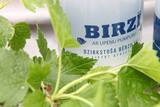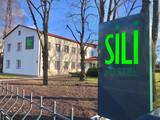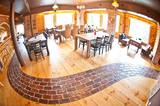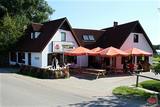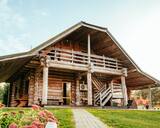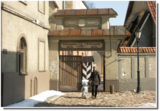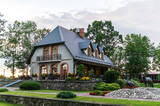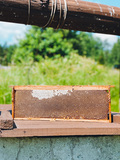| Nr | Name | Beschreibung |
|---|---|---|
|
Die Betriebsstätte befindet sich auf halbem Weg zwischen Rauna und Smiltene. Die Besucher können die Betriebsräume in einem Keller besichtigen, wo der sprudelnde Birkensaft produziert und gelagert wird. Dabei wird über den Birkensaft erzählt und Videos zur Gewinnung von Säften im Frühjahr gezeigt. Verkostung von Birkensaft, sprudelnden Getränken und Sirup aus Birkensaft. Es wird auch Löwenzahnwein angeboten. Die Produktion von Birzī hat ein Bio-Zertifikat. |
||
|
Hostel "Sili" is located near Jelgava, in Mežciems. It has 19 rooms, as well as a conference and event hall, fully equipped kitchens with all the necessary equipment and utensils for cooking (ceramic hob, refrigerator, kettle, microwave, pots, pans and kitchen utensils). New and pleasant shared toilets and showers are available on each floor. Room cleaning and a bed linen set are included in the price. Also accessible for disabled guests - there is a specially equipped room as well as facilities. Guests have free parking at the hostel. It is possible to organize business parties, weddings, birthdays and other events in the banquet hall, which can take up to 60 guests. There is a TOP shop next to the Sili Hostel, as well as a bus stop. The center of Jelgava can be easily reached by bus in about 15 minutes. on the trip. Convenient departure (without entering the center of Jelgava) to the highway A8, along which you can get to Riga by car in 30 minutes or at the Lithuanian border in 25 minutes. |
||
|
The only organically certified cider in Latvia. Our Story Apples Ciders For Visitors Where to Buy |
||
|
A biological farm in the lovely nature park of the Ogre River valley. You can tour the farm to see how biological cattle from the Charolais breed are bred. Walk down our nature trails to watch cows grazing in the fields. Visit the little Akmeņupīte stream and the large oak trees that are in the area. You can see the rapids of the Ogre River and, in the spring, broad fields of ramsons. The venue offers tastings of its products, and you can also purchase meat to take along with you. |
||
|
Das Gästehaus befindet sich in Karli. Es ist in dem ehemaligen Wohnhaus der Diener eingerichtet. Hier werden hauptsächlich einheimische Produkte verwendet und Speisen werden nur auf individueller und vorheriger Bestellung vorbereitet. Lettische Küche: Braten, Apfelblechkuchen, hausgemachtes Eis, Brotsuppe, Himmelsbrei, Steinpilzsoße, hausgemachter Wein. Das besondere Gericht: Bachforelle aus der Ortschaft Karli. |
||
|
Auf der Koppel von Saulstari weiden mehr als 400 Hirsche, Damhirsche, weiße Hirsche und Wildschweine. 4 Aussichtsturme für Beobachtung von Tieren, Exkursion. Die Gäste können die Tiere aus der Hand füttern, fotografieren. Picknickplatz, Angeln und Jagd nach Voranmeldung.
|
||
|
Die funktionelle Kräuter-Freilichtexposition macht mit der grünen Apotheke der Natur – mit mehr als 300 unterschiedlichen Pflanzen bekannt. Jeder, der die gesunde Lebensweise unterstützt, kann hier das Geheimnis der Phytotherapie erfahren. Hier kann man lernen, wie man verschiedene Saunabesen aus Zweigen, Kräutern und Blumen zusammenbinden, aromatische Schlafkissen, Drogen für Badewannen, heilende Tees und Pflanzenpulver vorbereiten kann, die als Nahrungszusatzstoffe verwendet werden. |
||
|
This is a place for leisure in Mazirbe along the Livonian shore. It is part of the Slītere National Park, and the venue welcomes solo travellers, families and groups of friends. There are six buildings which can accommodate up to 50 people – rooms for one, two or three visitors, as well as one room for 12 visitors. A new service building has a lavatory, shower and kitchen. Sauna services are available. Strautmaļi also has a banquet hall with a fireplace, an amazing collection of teaspoons, a library of books for all tastes, as well as beautiful paintings. The centre of Mazirbe is 3 km away, the sea is 2 km away. Silence, a pine forest, mushrooms, cranes. The venue is open from May 20 until September 3. The price is EUR 40 per night for two people. |
||
|
The boat "Gulbis" goes on trips along the Daugava, revealing the history of Koknese and Likteņdārzs, the stories of the Daugava, and will become a witness to today's story. It invites you to go along, enjoy, explore, remember, dream and relax, rinsing the waves of the Daugava, in complete peace, enjoying the sounds of nature and the stories of an audio guide. The boat can accommodate up to 20 guests on board. Route: Likteņdārzs - Koknese Lutheran Church - Koknese Castle Ruins - Perse River - Likteņdārzs Amphitheater - Likteņdārzs. The boat can also be booked for events such as birthdays, weddings, etc. Flight times can be viewed and tickets can be purchased on the website, as well as on board. |
||
|
Das Restaurant befindet sich am Ufer des Flusses Daugava mit einer schönen Aussicht (aus der Sommerterrasse) auf das Flusstal. Es ist ein beliebter Ort für Mahlzeiten mit einer modernen und reizvollen Innenausstattung aus Holz, Stein und roten Ziegeln. Nebenan befindet sich ein Geschäft. Lettische Küche: Sauerkrautsuppe nach dem Geschmack der Lettgallen, Steinpilz- und Kürbiscremesuppen, Bachforelle aus der Ortschaft Serene, gegrilltes Schweinefleisch, Schweinerippen, Kartoffelpfannkuchen, Erdbeersuppe mit Vanilleeis, Brotsuppe. Das besondere Gericht: Bratwurst von Klidziņa. |
||
|
Das Café befindet sich an der Umleitung von Jelgava zwischen Lielupe und Vircava. Hier werden Speisen aus Fleisch- und Milchprodukten der Region Zemgale und aus selbstgezüchtetem Gemüse angeboten. Das Café arbeitet mit dem Hirschgarten Rudiņi zusammen. Lettische Küche: Medaillons aus Schweinfilet im Bacon mit Zwiebelmarmelade, Wildschweinschinken mit Zwiebeln in Sahne, geschmortes Hirschfleisch mit Kartoffel- und Blumenkohlpüree, Kartoffelpfannkuchen mit Lachs in Sahne. Das besondere Gericht: Gebackener Apfel im Teig, Beerenblechkuchen. |
||
|
DZIMTAS VĪNU vīndares Martas Igaunes veidots ainavu dārzs ar augļu kokiem un ogulājiem starp bērzu puduriem un senču priedēm. Vīnogu, jāņogu un plūmju kolekcijas. Dabas veltes vīnu darināšanai. Vieta relaksējošai atpūtai dabā visai ģimenei senas Lubāna zvejnieku dzimtas mājasvietā. Ar varžu kori, putnu dziesmām, četriem skudru pūžniem un. Latgales smaržām un garšām. Apmeklētājiem piedāvājam dārza apskati, piknikošanas vietu, konsultācijas dārzkopībā un vīndarīšanā. No dārza un pļavas veltēm darināta vīna degustācijas tikai ar iepriekšējo pieteikšanos! |
||
|
The “Celmiņi” weekend house is found in a quiet and forested location in the Kūkas Parish of the Krustpils Administrative District. Guests can enjoy active leisure or relaxation that are provided by the surrounding environment. The venue has three types of saunas – a wet sauna, a steam or Turkish sauna, and a traditional Latvian sauna. There is a vat of water outside the sauna, and there is also relaxation in a bee healing process (a seasonal offer). There is a house with four bedrooms (up to 15 people), as well as two small huts where two people can stay. During the summer, there are another four camping huts for two persons. The venue can host parties up to 35 people, while the sauna building will accommodate up to 12 individuals. Depending on the season, there can be archery, paintball, creative workshops, soup cooked on a campfire, as well as educational activities for children. |
||
|
The biggest and the most impressive public decoration in the open air which was originally built in 2004 as the set for the film „The guards of Riga”and later as the set for the film directed by J.Streich „Rudolf’s inheritance”. Here you will also find the weapon museum Arsenal (contains weapons of different periods, uniforms and household goods), as well as the bakery "Laci". |
||
|
"Aldara alus darbnīca" ir modernākais alus muzejs Baltijas valstīs un pirmais Latvijā. Alus muzejs atrodas vēsturiskajā Aldara kvartālā – Sarkandaugavā. Pēc vērienīgas rekonstrukcijas, vēsturiskās ēkas atjaunošanas un alus ekspozīcijas izveides, muzejs savas durvis vēra 2015. gada maijā. Muzejs izvietots trijos stāvos 800 kvadrātmetru platībā. Muzeja interjerā ir akcentētas vēsturiskās liecības, tā lepnums ir autentiskā alus vārītavas zāle, kas neskarta saglabāta kopš 1938. gada. Tās senie alus vārīšanas vara katli ir retums, kas saglabājušies līdz pat mūsdienām. Izmantojot jaunākās tehnoloģijas, senajos vārīšanas katlos interaktīvā veidā ir iespējams izpētīt četru galveno alus sastāvdaļu – ūdens, apiņu, iesala un rauga – burvību. Alus muzejs "Aldara alus darbnīca" labi papildina ēkas otrajā spārnā izvietoto alus darītavu, kas ikdienā brūvē pašas izsmalcinātākās Aldara alus šķirnes. Aldara alus darbnīcas viesiem ir iespēja izzināt Latvijā un citviet pasaulē brūvēto alus šķirņu dažādību un šarmu, iepazīties ar alus brūvēšanas noslēpumiem, kā arī pašiem nogaršot dažādus alus veidus. Tiek arī piedāvātas telpas dažādiem pasākumiem - konferencēm, semināriem, svinībām un saviesīgiem vakariem. |
||
|
Auf dem Hof befindet sich eine Werkstatt für Lederwaren, die Pferdegeschirre, Riemen, Gurte, Ledersäcke u.a. herstellt. Hier wird eine Führung mit der Besichtigung der Ausstellung, mit dem Kennenlernen von Lederarten und mit dem Erwerb von Waren angeboten. Hier wird auch die Möglichkeit angeboten, Lederverarbeitung auszuprobieren. Die Wirtin erzählt über die lettgallische Lebensart. |
||
|
Māris und Dace Plūme beschäftigen sich seit 2010 mit der Cidre-Herstellung in Jumprava, nachdem sie Erfahrungen in den besten Cidre-Mostereien in Frankreich und Österreich gesammelt hatten. Die Getränke der Cidre-Mosterei „Mr.Plūme“ sind beim internationalen Cidre-Wettbewerb SISGA in Spanien mehrmals mit Goldmedaillen ausgezeichnet worden. |
||
|
Pirts un viesu nams atrodas 70 km attālumā no Rīgas, Ogres novada Ķeipenē. Saimniece piedāvā dažādus pirts rituālus - dzimšanas dienas, dāmu, terapeitisko pirts rituālu, u.c.; masāžas; aromdiagnostiku un terapiju. Viesu mājā pieejamas 3 divvietīgas guļamistabas, viesu rīcībā ir arī aprīkota virtuve. Blakus dīķim ir kubls ar masāžas funkcijām. Šī vieta piemērota arī dabas baudīšanai - to ieskauj ozoli, blakus ir dīķis ar peldvietu un mežs. |
||
|
Das Café befindet sich im Erholungskomplex Miķelis (am Ufer des Flusses Musa), wo man einen typischen Bauernhof aus dem 19. - 20. Jh. und das Fahrzeugmuseum besichtigen kann. Lettische Küche: Kalte Suppe, Salat der Stadt Valmiera, gebratene Ostseeflunder, Kartoffelpfannkuchen, Erdbeersuppe mit Eis. Das besondere Gericht: Die besonderen Speisen von Bauska, Schnitzel Miķelis. |
||
|
This is an apiary which you can tour and then taste honey and buy products. There are also sauna rituals for health and beauty. |
||
